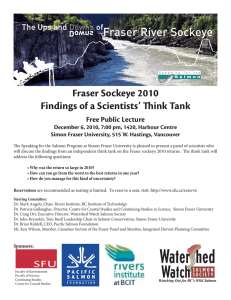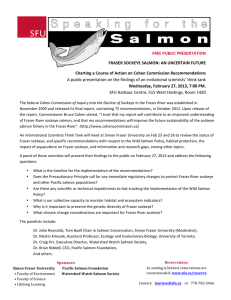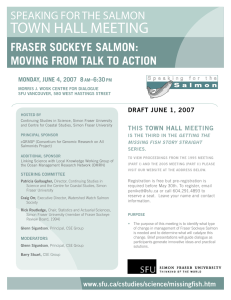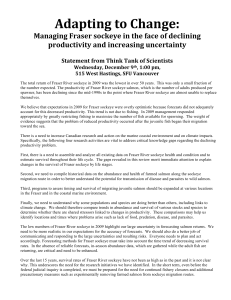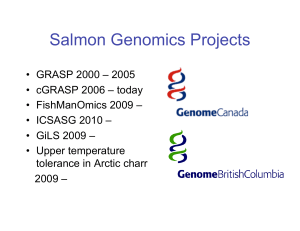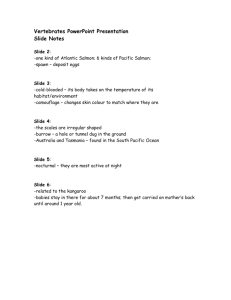TOWN HALL MEETING SPEAKING FOR THE SALMON
advertisement
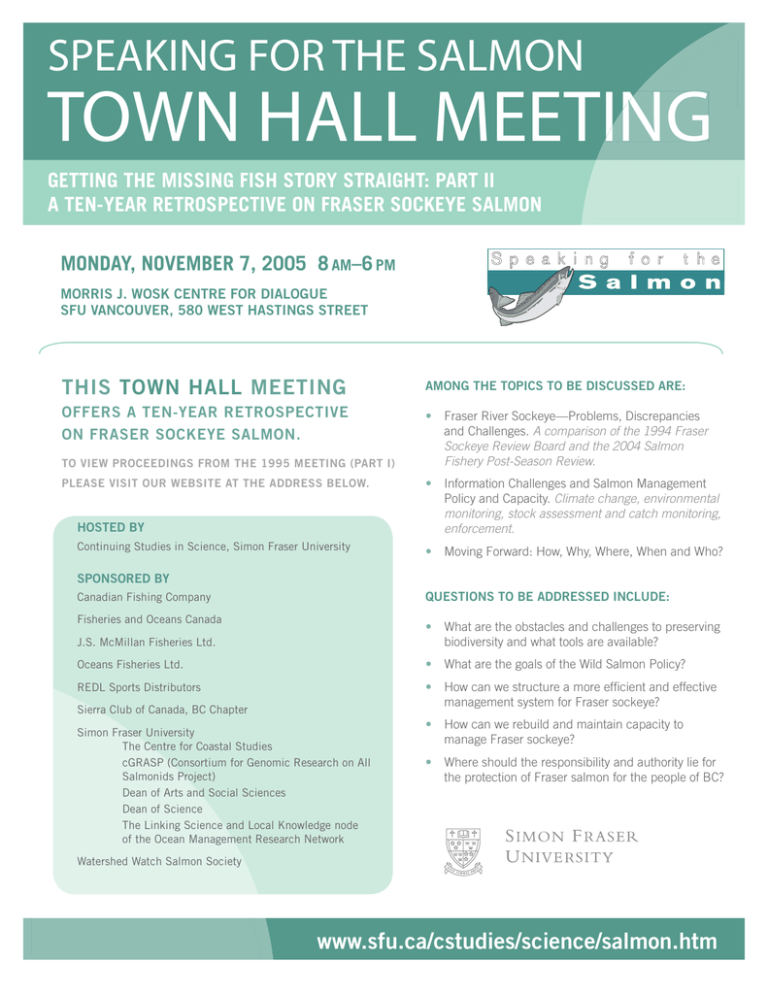
SPEAKING FOR THE SALMON TOWN HALL MEETING GETTING THE MISSING FISH STORY STRAIGHT: PART II A TEN-YEAR RETROSPECTIVE ON FRASER SOCKEYE SALMON MONDAY, NOVEMBER 7, 2005 8 AM–6 PM MORRIS J. WOSK CENTRE FOR DIALOGUE SFU VANCOUVER, 580 WEST HASTINGS STREET THIS TOWN HALL MEETING AMONG THE TOPICS TO BE DISCUSSED ARE: OFFERS A TEN-YEAR RETROSPECTIVE ON FRASER SOCKEYE SALMON. • Fraser River Sockeye—Problems, Discrepancies and Challenges. A comparison of the 1994 Fraser Sockeye Review Board and the 2004 Salmon Fishery Post-Season Review. • Information Challenges and Salmon Management Policy and Capacity. Climate change, environmental monitoring, stock assessment and catch monitoring, enforcement. • Moving Forward: How, Why, Where, When and Who? TO VIEW PROCEEDINGS FROM THE 1995 MEETING (PART I) PLEASE VISIT OUR WEBSITE AT THE ADDRESS BELOW. HOSTED BY Continuing Studies in Science, Simon Fraser University SPONSORED BY QUESTIONS TO BE ADDRESSED INCLUDE: Canadian Fishing Company Fisheries and Oceans Canada • What are the obstacles and challenges to preserving biodiversity and what tools are available? Oceans Fisheries Ltd. • What are the goals of the Wild Salmon Policy? REDL Sports Distributors • How can we structure a more efficient and effective management system for Fraser sockeye? • How can we rebuild and maintain capacity to manage Fraser sockeye? • Where should the responsibility and authority lie for the protection of Fraser salmon for the people of BC? J.S. McMillan Fisheries Ltd. Sierra Club of Canada, BC Chapter Simon Fraser University The Centre for Coastal Studies cGRASP (Consortium for Genomic Research on All Salmonids Project) Dean of Arts and Social Sciences Dean of Science The Linking Science and Local Knowledge node of the Ocean Management Research Network Watershed Watch Salmon Society www.sfu.ca/cstudies/science/salmon.htm SPEAKINGFORTHESALMONTOWNHALLMEETING GETTING THE MISSING FISH STORY STRAIGHT: PART II A TEN-YEAR RETROSPECTIVE ON FRASER SOCKEYE SALMON AGENDA STEERING COMMITTEE REGISTRATION AND WELCOME Patricia Gallaugher Director, Continuing Studies in Science and the Centre for Coastal Studies, Simon Fraser University 7:00 AM Registration and coffee 8:00 AM Welcome and Opening Arnie Narcisse Chair, BC Aboriginal Fisheries Commission Craig Orr Executive Director, Watershed Watch Salmon Society Brian Riddell Division Head, Salmon and Freshwater Ecosystems, Science Branch, Pacific Biological Station, Fisheries and Oceans Canada Rick Routledge Chair, Statistics and Actuarial Sciences, Simon Fraser University (member of Fraser Sockeye Review Board, 1994) MODERATORS Barry Stuart Dialogue Associate, Morris J. Wosk Centre for Dialogue John Borrows Chair, Aboriginal Justice and Governance, Faculty of Law, University of Victoria John Borrows, Workshop Moderator Michael Stevenson, President, Simon Fraser University Special Presentation to Centre for Coastal Studies by The Honourable Iona Campagnolo, Lieutenant Governor of British Columbia and Moderator of Getting the Missing Fish Story Part One, 1995 PART I IDENTIFYING THE PROBLEM(S) The Honourable Stephen Owen, Minister of State and Western Economic Diversification 8:30 AM – 9:15 AM Fraser River Sockeye — Problems, Discrepancies and Challenges. The findings of the 1994 Fraser River Sockeye Review Board and the 2004 Southern Salmon Fishery Post Season Review (please see website to view these documents) John Fraser, Chair, 1994 Fraser River Sockeye Review Board and Chair, BC Pacific Salmon Forum Gerry Kristianson, Member, 2004 Southern Salmon Fishery Post-Season Review Board and Commissioner, Pacific Salmon Commission Craig Orr, Member, 2004 Southern Salmon Fishery PostSeason Review Board and Executive Director, Watershed Watch Salmon Society 9:15 AM – 10:15 AM Open Discussion Panelists will be joined by members of GMFSS Steering Committee, Arnie Narcisse, Brian Riddell, Rick Routledge, Craig Orr • What are the similarities, differences? • What are the common issues? • What other factors have changed over the decade? • Is there adequate funding over the long term to do the job? If not, how can we change the situation? • Is this simply a monetary problem? GETTING THE MISSING FISH STORY STRAIGHT: PART II A TEN-YEAR RETROSPECTIVE ON FRASER SOCKEYE SALMON 10:15 AM – 10:30 AM Break 12:15 PM – 1:00 PM 3. Management, Process and Enforcement 10:30 AM – 1:00 PM Information Challenges and Salmon Management Policy and Capacity (Each issue discussed briefly by a panel followed by Dialogue) 10:30 AM – 11:30 AM 1. Climate change, environmental monitoring and salmon management • Are salmon (and our management regimes) capable of adapting to climate change? • Are we taking an ecosystem-based approach? • Given the uncertainty, is the approach precautionary? Frank Whitney, NE Pacific Ocean and climate change impacts, Fisheries and Oceans Canada Dan Moore, Associate Professor, Departments of Geography, and Forest Resources Management, University of British Columbia Scott Hinch, Professor, Institute for Resources, Environment and Sustainability, and Department of Forest Sciences, University of British Columbia Mike Lapointe, Chief Biologist, Fishery Management, Pacific Salmon Commission Arnie Narcisse, Fisherman 11:30 AM – 12:15 PM 2. Stock Assessment and Catch Monitoring • What are the trends — capacity, partnership, indicator stocks? • How much can we expect from the data? • Can we do the job? • What are the obstacles? • What are the communications, conflicts, and relationships? • What is the capacity? Ernie Crey, Senior Policy Advisor, Sto:lo Tribal Council Randy Nelson, Acting Director, Conservation and Protection, Fisheries and Oceans Canada Gerry Kristianson, Vice President, Fisheries, Sport Fishing Institute of BC 1:00 PM – 1:45 PM Lunch ICBC Concourse PART II MOVING FORWARD — HOW, WHY, WHERE, WHEN AND WHO? 1:45 PM – 2:30 PM 1. Conservation of biodiversity • Why is preserving biodiversity important? • What are the obstacles/challenges? • Are we prepared to sacrifice weak stocks? • Do we have the capacity to assess? • How do we address the trade offs between cultural and ecological values and economic opportunity? John Reynolds, Professor, Biological Sciences, Simon Fraser University Blair Holtby, Head, Salmon Section, Fisheries and Oceans Canada (tbc) Al Cass, Chair, Pacific Scientific Advice Review Committee and Science Branch, Fisheries and Oceans Canada Ken Wilson, Stock Assessment Coordinator, Fraser First Nation Dave Coutlee, Program Manager, Nicola Watershed Stewardship and Fisheries Authority, Nicola Tribal Association John Pierce, Professor, Geography and Dean of Arts and Social Sciences, Simon Fraser University John Brajcich, Capilano Fishing Ltd. Rick Routledge, Chair, Statistics and Actuarial Sciences, Simon Fraser University GETTING THE MISSING FISH STORY STRAIGHT: PART II A TEN-YEAR RETROSPECTIVE ON FRASER SOCKEYE SALMON 2:30 PM – 3:30 PM 4:45 PM – 5:45 PM 2. Fraser sockeye management 4. Where should the responsibility and authority for the protection of the Fraser sockeye lie? • How can we structure a more efficient and effective management system for Fraser sockeye? Arnie Narcisse, Chair, BC Aboriginal Fisheries Commission Bert Ionson, Acting Regional Resource Management Coordinator, Salmon, Fisheries and Oceans Canada Rob Morley, Vice-President, Canadian Fishing Company, and Past Chairman, Fisheries Council of Canada The Honourable David Anderson Chief Doug Kelly, First Nations Summit and Soowahlie First Nation Terry Glavin, Fisheries Writer and Researcher and Marine Conservation Advisor, Sierra Club of Canada, BC Chapter Craig Orr, Executive Director, Watershed Watch Salmon Society 5:45 PM – 6:15 PM Bill Otway, President, Sportfishing Defence Alliance Wrap Up and Open Discussion 3:30 PM – 3:45 PM Break 3:45 PM – 4:45 PM 3. Capacity • How can we rebuild and maintain capacity to manage Fraser sockeye? Marcel Shepert, Council Member, Pacific Fisheries Resource Conservation Council and Executive Director of the Fraser River Aboriginal Fisheries Secretariat and Coordinator of the Upper Fraser Fisheries Conservation Alliance Brian Riddell, Division Head, Salmon and Freshwater, Science Branch, Fisheries and Oceans Canada Paul Kariya, Executive Director, Pacific Salmon Foundation Steve Martell, Modelling, Fisheries Centre, University of British Columbia Paul Sprout, Regional Director General, Pacific Region, Fisheries and Oceans Canada 6:15 PM Reception GUIDELINES FOR PARTICIPATION IN DIALOGUE Purpose These guidelines, developed by the Workshop Steering Committee, are designed to: • Create opportunities to maximize participation • Foster a safe place for dialogue • Enable vigorous differences to surface without disrespecting anyone • Promote an open and full exchange of information/ideas • Generate an environment of shared learning Context for Dialogue • All sessions involve two parts 1. 5 minute presentations (kept short to initiate dialogue) 2. Open-mic dialogue • All proceedings will be taped Guidelines • Panelists respect time by keeping presentations to 5 mins • Participants respect time through concise comments and questions • Participants identify themselves when speaking • Participants listen and speak with respect • Participants try to find a good way to say difficult things • Let there be humour, where we explore tough issues together, in a good way, with a spirit of learning, creating a healthy and constructive learning environment • If there are any questions/concerns please bring them to facilitators • Thank you and Meegwetch www.sfu.ca/cstudies/science/salmon.htm
